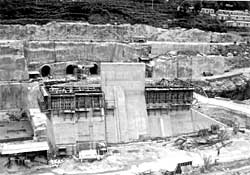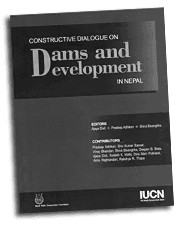 When the World Commission on Dams (WCD) released its report 'Dams and Development: A New Framework for Decision-making' in 2002, the polarised debate between supporters and opponents of large dams remained largely unresolved. Some countries rejected the report, others accepted it. Outside the formal halls of government, NGO leaders and activists remained as bystanders and critics, their interests acknowledged in the WCD report but only on a practical level, lacking mechanisms to play new roles that could take the Commission's findings forward. Most groups, whether governmental or within the wider civil society, based their response to the WCD on generalities rather than a detailed analysis of the manner in which it's findings or recommendations apply within their own country and context.
When the World Commission on Dams (WCD) released its report 'Dams and Development: A New Framework for Decision-making' in 2002, the polarised debate between supporters and opponents of large dams remained largely unresolved. Some countries rejected the report, others accepted it. Outside the formal halls of government, NGO leaders and activists remained as bystanders and critics, their interests acknowledged in the WCD report but only on a practical level, lacking mechanisms to play new roles that could take the Commission's findings forward. Most groups, whether governmental or within the wider civil society, based their response to the WCD on generalities rather than a detailed analysis of the manner in which it's findings or recommendations apply within their own country and context. Nepal is an exception to the above global pattern. The Constructive Dialogue on Dams and Development in Nepal reports the outcome of a unique process involving NGOs, activists, the government and academics to respond to the commission's findings. The constructive dialogue represents, as far as I am aware, the first initiative in any region to systematically analyse how the commission's findings actually apply to the situation in any country. The carefully edited and well written summary produced by the Constructive Dialogue takes the WCD report and identifies where the laws and processes in Nepal already conform to it and where issues remain to be addressed. The Dialogue also identifies key issues, such as those inherent in the definition of a 'high dam' or in notions of upper and lower riparian rights that simply don't apply or have little logic in the Nepali context.
Findings from the Constructive Dialogue provide essential guidance for any individual or organisation concerned with water resources development and the question of dams in Nepal. These findings make it possible to bridge the gap between proponents and opponents of dams-polarisation has largely given way to agreement on the importance of 'good' dams and the criteria necessary to ensure only 'good' dams are built.
 More importantly, however, the Constructive Dialogue process suggests an approach many regions could use to respond thoughtfully following the report of the WCD or, for that manner, most other contentious, divisive issues. The WCD acknowledged that its report was 'not intended as a blueprint' but more as a 'starting point for discussions, debates'. No global approach to sensitive social or development issues can capture or respond effectively to the nuances inherent in local contexts. As a result, the outcomes from such processes tend to dissipate in a blur of dissent as regions respond to the inevitable mismatch between global perspectives and local realities. The baby tends to get thrown out with the bath.
More importantly, however, the Constructive Dialogue process suggests an approach many regions could use to respond thoughtfully following the report of the WCD or, for that manner, most other contentious, divisive issues. The WCD acknowledged that its report was 'not intended as a blueprint' but more as a 'starting point for discussions, debates'. No global approach to sensitive social or development issues can capture or respond effectively to the nuances inherent in local contexts. As a result, the outcomes from such processes tend to dissipate in a blur of dissent as regions respond to the inevitable mismatch between global perspectives and local realities. The baby tends to get thrown out with the bath. The Constructive Dialogue has created a fundamentally different outcome from the above norm. The dialogue conducted, in effect, a broad-based social audit to clarify points of conformity, key issues and points of disagreement between the WCD's global perspective and the realities of Nepal. Because the dialogue involved social auditors from many walks of life-the government, NGOs, academics and activists-it has successfully adapted the commissions findings to local realities. Such adaptive processes are essential in many fields in order to moderate the increasing disjuncture between globalisation processes and much more localised cultural, environmental, economic and social perspectives.
Overall, Constructive Dialogue on Dams and Development in Nepal is a good dam book reporting on a dam good process.
Marcus Moench is the director of the Institute for Social and Environmental Transition-International (ISET)


